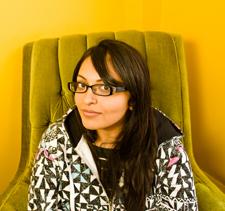Life experience has a peculiar way of shaping the work we choose. For local anti-racist queer activist Monika Thakker, her encounters with racism, homophobia and sexual violence have led her to the frontlines of advocacy activism and social work, where she feels she can make a difference by connecting to those whose experiences overlap with her own.
“I don’t come from a social work background — I’ve never actually taken a course in social work, but I’ve been on the receiving end of social services. And all the work I do has something to do with my personal experiences,” says Thakker. “It can be difficult to get the kind of support you need from your friends, family and community, and social service agencies are given the task of being there to support you, which is great, but it doesn’t address stigma.”
As a queer woman of colour who has experienced the immigration process and once lived without status in the US, Thakker is committed to improving services for people who are marginalized and under-represented, supporting efforts that increase visibility and make important services more broadly accessible.
She does frontline support work at Centre 454 — a local day shelter She is a member of Ottawa’s queer women-of-colour group, Agitate!, and volunteers for No One Is Illegal Ottawa, a coalition of migrants and allies. With No One Is Illegal, she fights for immigrant and refugee rights and advocates for people living without status in Canada.
Thakker’s newest project is coordinating the Sexual Assault Support Centre of Ottawa’s queer outreach program. This position, while part-time, is a big gay leap forward for SASC. It’s a paid position that dedicates time to creating programming for and about queer women who have experienced sexual violence.
While SASC has served queer women for years — on their 24-hour hotline, in individual sessions and in support groups — the organization has never before had programs that address the unique issues facing queer women survivors of sexual assault and abuse.
“Over the years, we’ve heard from queer service users that they would want a group for queer survivors because it’s a really different environment than in a general group, where the dominant analysis of sexual abuse is heterosexist,” says Thakker. “For example, there are certain stereotypes that, if you’ve been [sexually] abused by a man, it has somehow made you gay. Or if you were abused by a woman, that’s why you like women — but there’s never that question of abuse making someone straight. Sexual abuse affects anyone’s sexuality, but it’s especially difficult if you’re queer because sexism and homophobia begin to serve each other.”
“Also, queer communities in Ottawa are very small, so to openly discuss personal details with strangers from the community — there can be a holding back of information. We’ll have to facilitate groups differently so that our services are helpful and relevant.”
Recently, Thakker has started facilitating information sessions at local schools and community organizations, such as The Well, the AIDS Committee of Ottawa and the Rainbow Youth Forum. She presented a workshop on violence within queer relationships as part of Snowblower on Feb 9.
While a number of women have expressed interest in having a support group by and for queer women survivors since Thakker began her job in October, solid plans haven’t coalesced because of logistical complications stemming from the recent bus strike. Thakker encourages women to contact SASC if they would like to find out more about being part of a support group for queer women survivors in the future.
When asked about future directions for queer outreach at SASC, Thakker jumps in with a few key goals for the program.
“Right now, I’m applying for a grant to do advocacy and support work with queer immigrants. The countries that you would be coming from, you can’t really be out or have any photos or other documentation. It’s really difficult to prove that you’re gay, [and you need to] in order to get refugee status.”

 Why you can trust Xtra
Why you can trust Xtra


